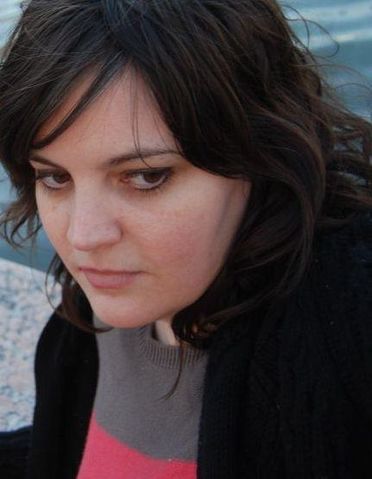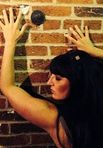Carpe Noctem Interview With Stephanie Rogers
 Saturnalia Books, 2016 THINGS WE’RE DYING TO KNOW…
Saturnalia Books, 2016 THINGS WE’RE DYING TO KNOW…Let’s start with the book’s title and your cover image. How did you choose each? And, if I asked you to describe or sum up your book, what three words immediately come to mind?
I spent about five years sending out this book manuscript before it was accepted for publication. In that time, the book went through several titles, including my MFA thesis title, Beautiful Ways to Die, as well as a weirder line from one of my poems, My Childhood Invention of the Rooftop Woman. After it was a finalist and semifinalist in several contests, I knew I was getting closer to publishing it and searched for a clearer way to organize the poems in the manuscript, which is when I came up with the three section dividers—three definitions of the phrase, “To Pluck.” The title, Plucking the Stinger, came fairly quickly after that. I especially like the way the title plays off my poems—the image of a violent sting coupled with the tender act of removing it. I think most of my poems tend to dwell in that juxtaposition.
Regarding the cover, I sought out the artist, Regan Rosburg, after seeing the cover of Yearling, a book of poems by Lo Kwa Mei-en that Regan had supplied the cover art for. When I visited Regan’s website and saw “The Nursery,” which would become my book cover, I immediately fell in love with the bright jellyfish and bird imagery next to the much darker wasp nest. Ultimately, I hope the beauty and violence in the artwork coincides with that similar back and forth in my poems.
Can you describe your writing practice or process for this collection? Do you have a favorite revision strategy?
Because the book was written over the course of 10 years, I often employed a variety of revision strategies while writing it. I wrote maybe five poems during that time that felt “complete” after only the first draft, and that’s extremely rare for me. (I know some poets who feel that lightning-strike quite often.) Usually, though, I tend to write almost a stream-of-consciousness draft, in one block (without any line breaks), and then mold that into an eventual poem by reorganizing, cutting and breaking lines. My poet friends who see draft after draft of my work tend to laugh at how each revision contains a new set of line breaks. I think I focus on those as a way to control what might otherwise seem unwieldy in my poems, which sometimes get surreal and lean toward the long. Focusing on craft helps me contain the poems within the peculiar worlds I’ve created.
Can you share an excerpt from your book? And tell us why you chose this poem for us to read—did it galvanize the writing of the rest of the collection? Is it your book’s heart? Is it the first or last poem you wrote for the book?
To sort of clarify my answer to the previous question, I’ll share a pantoum I wrote about obsession and the somewhat disordered place our minds (and bodies) go when experiencing loss, particularly as it pertains to turning inward and becoming self loathing. It’s the second poem in the book, and I chose to write it as a pantoum, with similar line lengths, in order to lock down the strangeness of the world without letting it veer too far in the direction of chaos, if that makes sense.
Operations on My Other, Lesser Self
Hello in there, ruined and inappropriate heart.
I’ve come bearing a toothbrush and a reason
not to return the surgical scissors, the joint, art
books, the spit-shined shoes, aim, everything.
I’ve come bearing a tooth, a brush, and a reason
for cradling your bird-egg cheek, for shredding
books, the spit, shined shoes, aim, everything
with a god or fingertips. When the sun’s red,
cradling a bird egg against her cheek, shredding
the day, I walk the hilltop with a stethoscope
and God. My fingertips listen to your sun-red
face like ten cast-off bones digging a scalpel
into the day. I walk the hilltop as a stethoscope
aiming to hear everything caged, everything’s
tin face, bones cast off by my digging scalpel.
Hello, I said, I never wanted this endlessness,
aiming to hear everything. Caged, everything’s
lonely, baring teeth, and like you, repeating
a hello I said I never wanted. That endlessness
thuds like a dirty shovel on a coffin, remember?
I’m lonely, baring teeth, and like you, repeating
my mistakes undercover, so only the eager hear
the shoveled dirt thudding the coffin. Remember,
I brought a reason to find you, brushes to clean
you, to uncover you here in my eager mistakes.
I’m haunted by what nests in you, what hole
I brought, brushing to find you a clean reason
to love. In the beginning, I saw, aimed to steal
what nests, what hole I’m haunted by. In you,
the stitches rip too often, fall out, don’t take
to love in the beginning. I saw, aimed to steal
another. Who are we? Cut up inside again,
the stiches rip too often, fall out, or don’t take
to surgery, the scissors I return for our joint art.
Who are we to cut up, our own insides again
ruined and inappropriate? Heart, hello in there?
For you, what is it to be a poet? What scares you most about being a writer? Gives you the most pleasure?
I grew up in Middletown, Ohio, as a lower-middle class kid who didn’t really expect to go to college. No one in my family had gotten anything past a high school education. In grad school, especially, I spent a ton of energy just trying to pretend I belonged there with the other poets and that I deserved to be there even if my family didn’t value, at the time, a liberal arts education. I also needed to acknowledge that, as someone who “straddled” the worlds of poverty and drug addiction growing up, and who then inhabited the world of upward mobility that graduate school represented for me at the time, I faced a kind of identity crisis, asking myself, “Who am I if I’m no longer just this welfare kid who grew up kinda poor and almost flunked out of high school?”
This is a long-winded way of expressing that what scares me most about being a writer—a poet, in particular—is feeling like I don’t have the right, the luxury, that what I have to say isn’t important enough. Publishing a book of poems shouldn’t necessarily be accompanied by feelings of embarrassment and shame, but I think people who grew up in abusive homes, in poverty, with people who didn’t value education, could reasonably identify with these emotions. But there’s pleasure there, too, in knowing that I’ve been able to work through those voices from my upbringing.
Some of the themes in the book deal with childhood trauma, addiction, depression and recovery—the stuff I grew up with. And it gives me pleasure to have found a way into that world, through language, and in turn, to have found my way out of it, too. For me, being a poet means being able to look closely at yourself, to interrogate your own insecurities, as well as whatever privileges and disadvantages you carry with you, and to put your individual, bizarre world into words.
Do you think poets have a responsibility as artists to respond to what’s happening in the world, and put that message out there? Does your work address social issues?
I do think poets should address social issues, but I also strongly believe in the important feminist message that the personal is political. It’s absolutely a political act to write about one’s personal experiences with depression, with suicide loss, with addiction, with childhood trauma—all themes in my book—because those experiences are part of a larger cultural narrative that undervalues or devalues those issues. Our mental healthcare system in this country, for instance, needs a major overhaul, and that includes making sure people get the help they need. Writing a poem about struggling with addiction, or with the loss of a loved one to suicide, definitely speaks to the larger social issues of the day, and I think, unfortunately, there’s sometimes a tendency to dismiss “personal poetry,” especially when women write it, as nothing more than fulfilling some sentimental urge to whine about our lives.
What are you working on now?
I’m currently working on what seems to be an endless string of poems about my father’s sudden death. I call it “sudden” because it was unexpected, although he dealt with mental health and addiction issues his whole life, which greatly informs the kind of poetry I read and write. I’m also working toward engaging more with fat acceptance in my poetry. I always find myself wanting to read poems about how fat women deal with the incessant barrage of discrimination and insults directed at us, and I’ve been thinking maybe it’s time I write about my own personal experiences and traumas in that regard.
***
Purchase Plucking the Stinger. You can also find the title on Amazon.
From the publisher: A girl rides on an outgrown tricycle, biting a necklace of candy hearts. A woman sleeps with a bullet under her tongue. In these vivid and crushing poems, despair has a scent and it’s “half perfume, half something rotten.” Wild with loss and obsession, the poems of Plucking the Stinger throb like medication in the throat, a ballet interrupted by a couple breaking up, a false positive test, the terrible death of someone dear. This book is a love letter to grief with no return address.
 Stephanie Rogers grew up in Middletown, Ohio and now lives in New York City. Her poems have appeared or are forthcoming in journals such as Ploughshares, Cincinnati Review, New Ohio Review, Southern Review and Pleiades, as well as the Best New Poets anthology. Her first collection of poems, Plucking the Stinger, is forthcoming from Saturnalia Books in October. Find her online at
Stephanie Rogers grew up in Middletown, Ohio and now lives in New York City. Her poems have appeared or are forthcoming in journals such as Ploughshares, Cincinnati Review, New Ohio Review, Southern Review and Pleiades, as well as the Best New Poets anthology. Her first collection of poems, Plucking the Stinger, is forthcoming from Saturnalia Books in October. Find her online at www.stephaniemrogers.com.
Published on September 14, 2016 09:15
No comments have been added yet.



